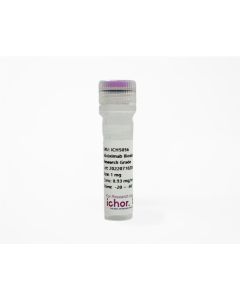Back to Top
Ipilimumab Biosimilar - Research Grade
$315.00 - $19,890.00
Add recommended extras
Ipilimumab Biosimilar - Research Grade
| Species Reactivity | Human |
|---|---|
| Target | CTLA-4 |
| Concentration | 1.0 - 5.0 mg/ml |
| Isotype | Human IgG1 Kappa |
| Host | Humanized |
| Use | Products are for research use only. Not for use in diagnostic or therapeutic procedures. |
| Storage | Stable for at least one week when stored sterile at 2-8°C. For long term storage aseptically aliquot in working volumes without diluting and store at ï؟½80°C. Avoid Repeated Freeze Thaw Cycles. |
| Endotoxin | ≤ 1.0 EU/mg as determined by the LAL method |
| Purity | >95% by SDS-PAGE and HPLC |
| Formulation | Phosphate buffered saline (PBS) pH 7.2,with no carrier protein, potassium or preservatives added. BSA and Azide free. |
| Purification Method | This monoclonal antibody was purified using multi-step affinity chromatography methods such as Protein A or G depending on the species and isotype. |
| Specificity | Detects human CTLA-4. This non-therapeutic antibody uses the same sequence as the therapeutic antibody Ipilimumab. |
| Shipping Conditions | Blue ice |
| background | Ipilimumab biosimilar is a recombinant, human monoclonal antibody that binds to the cytotoxic T-lymphocyte-associated antigen 4 (CTLA-4). Ipilimumab biosimilar is an IgG1 kappa immunoglobulin with an approximate molecular weight of 148 kDa. Ipilimumab bio |
| Other names | Ctla4, Cytotoxic T-lymphocyte protein 4, CD152 |
| UniProt | P16410 |
| Buffer | ICH3001-100ml ICH3002-100ml ICH3003-100ml |
| Sequence | https://www.imgt.org/mAb-DB/ |
Write Your Own Review


















